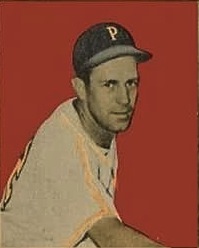Murry Dickson
| Murry Dickson | |||
|---|---|---|---|

Dickson's 1949 Bowman Gum baseball card
|
|||
| Pitcher | |||
|
Born: August 21, 1916 Tracy, Missouri |
|||
|
Died: September 21, 1989 (aged 73) Kansas City, Kansas |
|||
|
|||
| MLB debut | |||
| September 30, 1939, for the St. Louis Cardinals | |||
| Last MLB appearance | |||
| September 14, 1959, for the Kansas City Athletics | |||
| MLB statistics | |||
| Win–loss record | 172–181 | ||
| Earned run average | 3.66 | ||
| Strikeouts | 1,281 | ||
| Teams | |||
| Career highlights and awards | |||
|
|||
Murry Monroe Dickson (August 21, 1916 – September 21, 1989) was an American right-handed pitcher in Major League Baseball during the 1940s and 1950s. He was known for his vast array of pitches and deliveries — one of his managers, Eddie Dyer, nicknamed him "Thomas Edison" for his inventiveness — and for the longevity of his career.
Although Dickson would lead the National League in defeats for three successive seasons (1952–54), he pitched the St. Louis Cardinals to the 1946 NL pennant by beating the Brooklyn Dodgers in the decisive Game 2 of the league playoffs. Then, during the 1946 World Series, he started Game 7 against the Boston Red Sox, a game the Cards would ultimately win for the world championship.
Born in Tracy, Missouri, Dickson entered professional baseball and the vast Cardinal farm system in 1937. After three outstanding minor league seasons with the 1939 Houston Buffaloes (winning 22 games to lead the Texas League) and the 1940–41 Columbus Red Birds, Dickson joined the Cardinals for good in 1942. He compiled a 14–5 record for the Cards in 1942–43 (both clubs reaching the World Series) before joining the U.S. Army for military service in the European Theater of Operations during World War II.
...
Wikipedia
